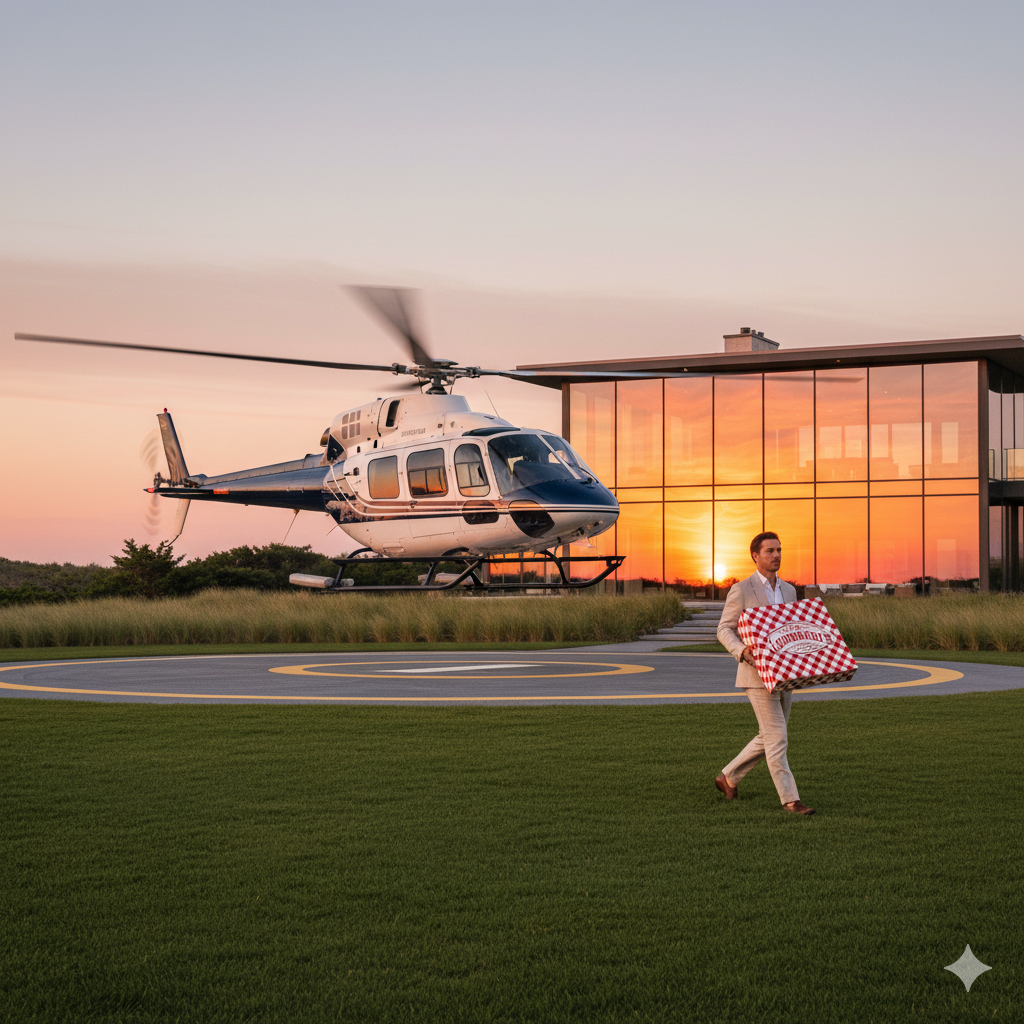The surprising psychology behind why successful people will spend $2,000 to recreate a $3 slice, with fascinating behavioral insights.
The $2,000 Slice
Consider this curious scene that unfolded last summer at East Hampton Airport. A Sikorsky S-76 helicopter touches down on the tarmac, its rotors slowing to a whisper. Inside the luxurious cabin, carefully climate-controlled boxes contain something worth more than its weight in gold—six coal-fired pizza slices from Lombardi’s, America’s first pizzeria.
The total cost for this gastronomic airlift? Nearly $2,000 when you factor in the helicopter charter, specialized thermal packaging, and coordination fees. The pizza itself? Eighteen dollars. Yet for the hedge fund executive who commissioned this delivery, it represented something far more valuable than sustenance.
Welcome to the invisible war reshaping how New York’s ultra-wealthy experience food. Blade helicopter services report a 340% increase in “culinary cargo” requests since 2019, with New York pizza ranking as the most transported food item.
The Tipping Point of Taste Memory
Malcolm Gladwell famously wrote about how small changes make big differences. In luxury consumption, we’re witnessing a tipping point where authenticity trumps convenience. The wealthy aren’t just buying pizza—they’re purchasing memory, identity, and social currency.
Dr. Russell Belk’s research on luxury consumption tendencies reveals that high-net-worth individuals increasingly use food choices as identity markers. They don’t say “I’m successful.” Instead, they demonstrate it through seemingly irrational acts like helicopter pizza delivery.
Consider the psychology at work. A venture capitalist worth $50 million doesn’t need to prove wealth through expensive purchases. However, the ability to recreate a specific New York pizza experience—say, that exact char pattern from Joe’s Pizza or the coal-fired crust from John’s of Bleecker—signals something more sophisticated: cultural knowledge and discerning taste.
The Authenticity Premium
This phenomenon extends beyond simple luxury consumption. Behavioral economists call it “authenticity signaling”—when consumers pay exponentially more for products that maintain their original context. Research shows that luxury dining motivations stem from both hedonic and social factors.
The helicopter pizza trend reveals three psychological triggers driving these decisions. First is the “origin story effect”—the belief that food tastes different in its birthplace. Second is “effort justification,” where the elaborate delivery process enhances perceived value. Third is “exclusivity signaling,” demonstrating access to services unavailable to ordinary consumers.
Sarah Chen, who runs a family office managing $800 million in assets, explains her monthly pizza airlift from Prince Street Pizza: “It’s not about the money. It’s about maintaining connections to the city that made me who I am. When my guests ask about the pizza, they understand they’re experiencing something authentic.”
The Network Effect of Elite Dining
Like any tipping point, this trend spreads through networks. The same social circles that frequent Manhattan’s most exclusive restaurants now compete over pizza authenticity stories.
Investment banker Marcus Rothwell discovered this accidentally. After mentioning his helicopter delivery from Patsy’s East Harlem location at a Hamptons dinner party, three other guests revealed similar arrangements. “Suddenly everyone was comparing their pizza sources like wine collections,” he recalls. “It became a status symbol I didn’t realize I was creating.”
The social proof mechanism works powerfully here. Research indicates that luxury restaurant attitudes spread through peer influence more than marketing. When high-status individuals adopt unusual behaviors, their networks follow rapidly.
The Economics of Emotional Value
Traditional economic theory suggests this behavior is irrational. However, behavioral economics research reveals why ultra-wealthy consumers make seemingly illogical choices. They’re not buying pizza—they’re purchasing emotional satisfaction, social positioning, and identity reinforcement.
The cost becomes irrelevant when viewed through this lens. For someone earning $500,000 monthly, spending $2,000 on pizza delivery represents the same percentage of income as a middle-class person buying a $20 meal. Yet the emotional and social returns far exceed this financial comparison.
Neuroscientist Dr. Antonio Damasio’s research shows that decision-making involves emotional centers more than rational calculation. The anticipation, planning, and storytelling around helicopter pizza delivery activates reward pathways worth far more than the monetary cost.
The Technology Enablers
This trend couldn’t exist without sophisticated logistics. Blade’s Sikorsky S-76 service offers 35-minute flights from Manhattan to East Hampton, with specialized climate-controlled compartments maintaining pizza temperatures within two degrees.
The company now partners with twelve iconic pizzerias, creating “authenticity preservation protocols.” Pizzas are partially pre-baked, flash-frozen during transport, then finished in conveyor ovens at Hamptons destinations. This process maintains the crucial textural elements that define each pizzeria’s signature style.
Technology eliminates friction, making impulsive culinary decisions possible. The same executive who spent months researching art investments can now satisfy a Prince Street Pizza craving with fifteen minutes’ notice. Convenience enables emotional spending in ways previously impossible.
The Cultural Implications
This phenomenon reflects broader shifts in how wealth signals status. Traditional luxury markers—expensive cars, jewelry, clothing—have become democratized through financing and counterfeiting. Experiences, especially highly specific ones like authentic New York pizza delivered by helicopter, resist replication.
Food anthropologists note similar patterns throughout history. Roman elites imported exotic delicacies across continents to demonstrate sophistication. Medieval nobility prized spices worth more than gold. Today’s ultra-wealthy continue this tradition, using culinary authenticity as cultural capital.
The trend also suggests changing relationships between urban and suburban elite lifestyles. Rather than abandoning city connections for Hamptons retreats, the wealthy maintain dual identities through elaborate preservation of urban experiences.
The Future of Luxury Logistics
Industry experts predict this model expanding beyond pizza. Requests now include bagels from Russ & Daughters, dumplings from Joe’s Shanghai, and croissants from specific Manhattan bakeries. The infrastructure supporting these deliveries grows more sophisticated monthly.
Behavioral economist Dr. Dan Ariely suggests we’re witnessing the emergence of “micro-luxury experiences”—highly specific, difficult-to-replicate services that command premium pricing despite modest underlying products. This represents a fundamental shift from possession-based to experience-based luxury consumption.
The psychological satisfaction derived from these experiences often exceeds that of traditional luxury purchases. A $50,000 watch provides momentary pleasure. However, the story of helicopter pizza delivery generates social currency for months, creating lasting value beyond the initial cost.
The Broader Implications
This trend illuminates how human psychology remains constant despite technological advancement. The same social signaling that drove medieval feasts and Gilded Age dining excess now manifests through helicopter pizza delivery. Tools change; motivations remain remarkably consistent.
For businesses serving ultra-wealthy clients, the lesson is clear: authenticity and exclusivity matter more than traditional luxury markers. The future belongs to companies that understand emotional value creation, not just product delivery.
Perhaps most tellingly, this phenomenon reveals how prosperity shapes perspective. For most people, good pizza is good pizza. For those who can afford anything, the story behind the pizza becomes more valuable than the pizza itself. In the end, we’re all still telling stories around the campfire—some of us just happen to use helicopters for grocery runs.
Join the Social Life Community
Ready to experience the intersection of luxury and authenticity? Contact us to inquire about advertising opportunities or submit your own luxury lifestyle articles.
Subscribe to our exclusive email list for insider invitations to the most coveted Hamptons events and special offers.
Experience the ultimate in luxury lifestyle with a Social Life Magazine print subscription, delivered directly to Manhattan’s most prestigious addresses.
Don’t miss Polo Hamptons 2026—secure your tickets, cabanas, and corporate sponsorships for the season’s most exclusive sporting and social event.


